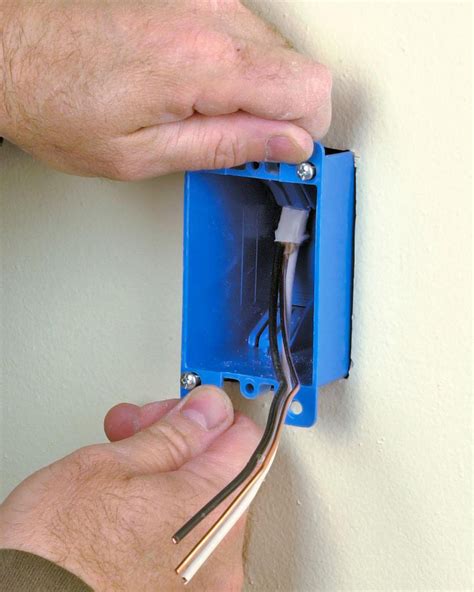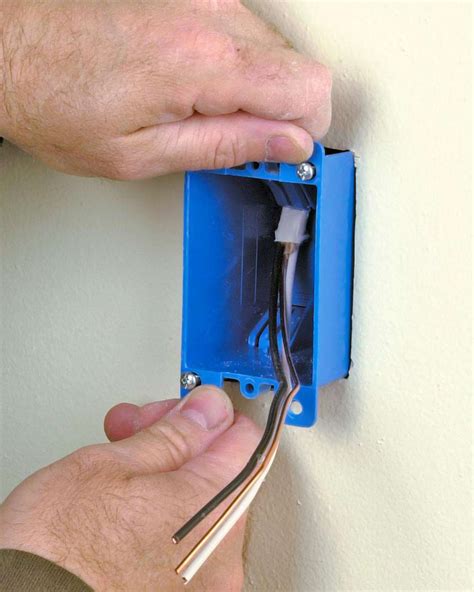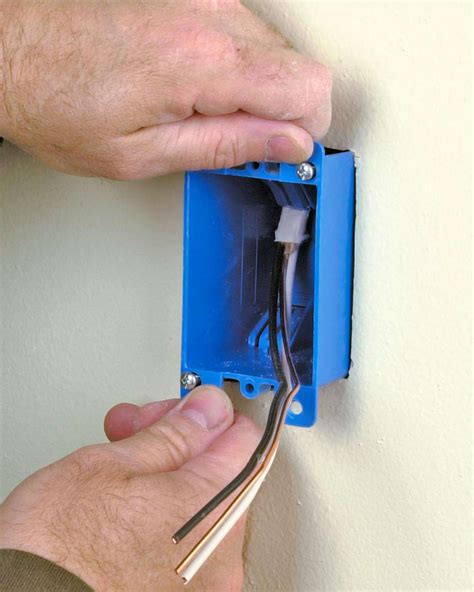add a box to existing electrical box Installing an "old-work" electrical box or receptacle refers to methods used to add a metal or plastic electrical box into an existing wall or ceiling without having to make extensive cuts into . Our range of outdoor junction boxes provide reliable, weatherproof protection. With an array of models from Masterplug and options supplied with their terminal block, you can shop by size or the number of gangs required.
0 · installing wall mounted electrical boxes
1 · installing electrical box on drywall
2 · installing electrical box in wall
3 · installing an electrical box
4 · install new electrical box
5 · electrical outlet box installation
6 · electrical box installation instructions
7 · adding electrical box existing wall
$37.72
How to Install an Electrical Box in a Finished Wall. Follow these expert tips to install an electrical box into drywall or plaster without the need for wall studs or joists.

Installing an "old-work" electrical box or receptacle refers to methods used to add a metal or plastic electrical box into an existing wall or ceiling without having to make extensive cuts into . I'm thinking about adding a second 200 amp box next to the primary box, and splitting the power from the meter, to feed each box. Is this feasible and allowed by code? .An “old-work” electrical box is designed to be installed in sheetrock without nailing into a stud. Instead, the box has tabs that flip out and hold it to the drywall between studs. To start, use a stud finder to locate and mark the studs in . After you verify that the circuit is powered down, you can start installing your junction box. 1. Attach Box to Stud. If you’re installing an interior box, use screws or nails to attach the box to a stud, positioned so that the face .
To keep this project simple, place the new outlet in the same stud cavity as an existing indoor outlet. Start by choosing the interior outlet you want to use. Building codes prohibit tapping into circuits in the kitchen, bathroom, . If you're going to mount the boxes in the ceiling, use a 4x4 steel box. If they ever decide to drywall the ceiling, they can reposition the steel box and add an "octagon box style" mud ring to the box, so the mud ring winds up .
How to Install an Electrical Box in a Finished Wall. Follow these expert tips to install an electrical box into drywall or plaster without the need for wall studs or joists. Installing an old work box into an existing wall to add an outlet or wall switch is an easy project that requires just a few common tools that you may already own if you're familiar with basic electrical repairs.
When you run out of space in your electrical service panel (also called a breaker box), you have two choices: have a professional upgrade the service panel or install a subpanel yourself.
Tying this second breaker box into the house circuitry is as simple as adding another breaker to the main panel. As long as the new circuit is wired to carry enough amps to drive all of the circuits that will be installed into it, this .Installing an "old-work" electrical box or receptacle refers to methods used to add a metal or plastic electrical box into an existing wall or ceiling without having to make extensive cuts into the building surfaces. I'm thinking about adding a second 200 amp box next to the primary box, and splitting the power from the meter, to feed each box. Is this feasible and allowed by code? Typically no. What you'll want to do is run a subpanel to your main panel.
An “old-work” electrical box is designed to be installed in sheetrock without nailing into a stud. Instead, the box has tabs that flip out and hold it to the drywall between studs. To start, use a stud finder to locate and mark the studs in order to avoid them. After you verify that the circuit is powered down, you can start installing your junction box. 1. Attach Box to Stud. If you’re installing an interior box, use screws or nails to attach the box to a stud, positioned so that the face of the box is flush with the drywall. To keep this project simple, place the new outlet in the same stud cavity as an existing indoor outlet. Start by choosing the interior outlet you want to use. Building codes prohibit tapping into circuits in the kitchen, bathroom, laundry room or into those dedicated to a large appliance, like a refrigerator. If you're going to mount the boxes in the ceiling, use a 4x4 steel box. If they ever decide to drywall the ceiling, they can reposition the steel box and add an "octagon box style" mud ring to the box, so the mud ring winds up even with the drywall once it's finished.
How to Install an Electrical Box in a Finished Wall. Follow these expert tips to install an electrical box into drywall or plaster without the need for wall studs or joists. Installing an old work box into an existing wall to add an outlet or wall switch is an easy project that requires just a few common tools that you may already own if you're familiar with basic electrical repairs. When you run out of space in your electrical service panel (also called a breaker box), you have two choices: have a professional upgrade the service panel or install a subpanel yourself. Tying this second breaker box into the house circuitry is as simple as adding another breaker to the main panel. As long as the new circuit is wired to carry enough amps to drive all of the circuits that will be installed into it, this .
Installing an "old-work" electrical box or receptacle refers to methods used to add a metal or plastic electrical box into an existing wall or ceiling without having to make extensive cuts into the building surfaces. I'm thinking about adding a second 200 amp box next to the primary box, and splitting the power from the meter, to feed each box. Is this feasible and allowed by code? Typically no. What you'll want to do is run a subpanel to your main panel.
An “old-work” electrical box is designed to be installed in sheetrock without nailing into a stud. Instead, the box has tabs that flip out and hold it to the drywall between studs. To start, use a stud finder to locate and mark the studs in order to avoid them. After you verify that the circuit is powered down, you can start installing your junction box. 1. Attach Box to Stud. If you’re installing an interior box, use screws or nails to attach the box to a stud, positioned so that the face of the box is flush with the drywall. To keep this project simple, place the new outlet in the same stud cavity as an existing indoor outlet. Start by choosing the interior outlet you want to use. Building codes prohibit tapping into circuits in the kitchen, bathroom, laundry room or into those dedicated to a large appliance, like a refrigerator.

installing wall mounted electrical boxes

spongebob clean metal meme house

$11.98
add a box to existing electrical box|electrical outlet box installation